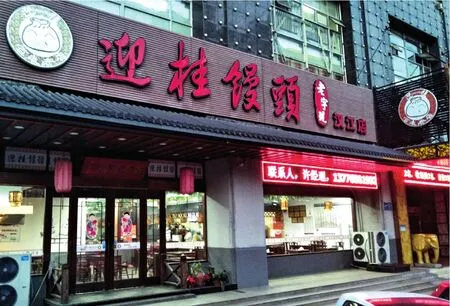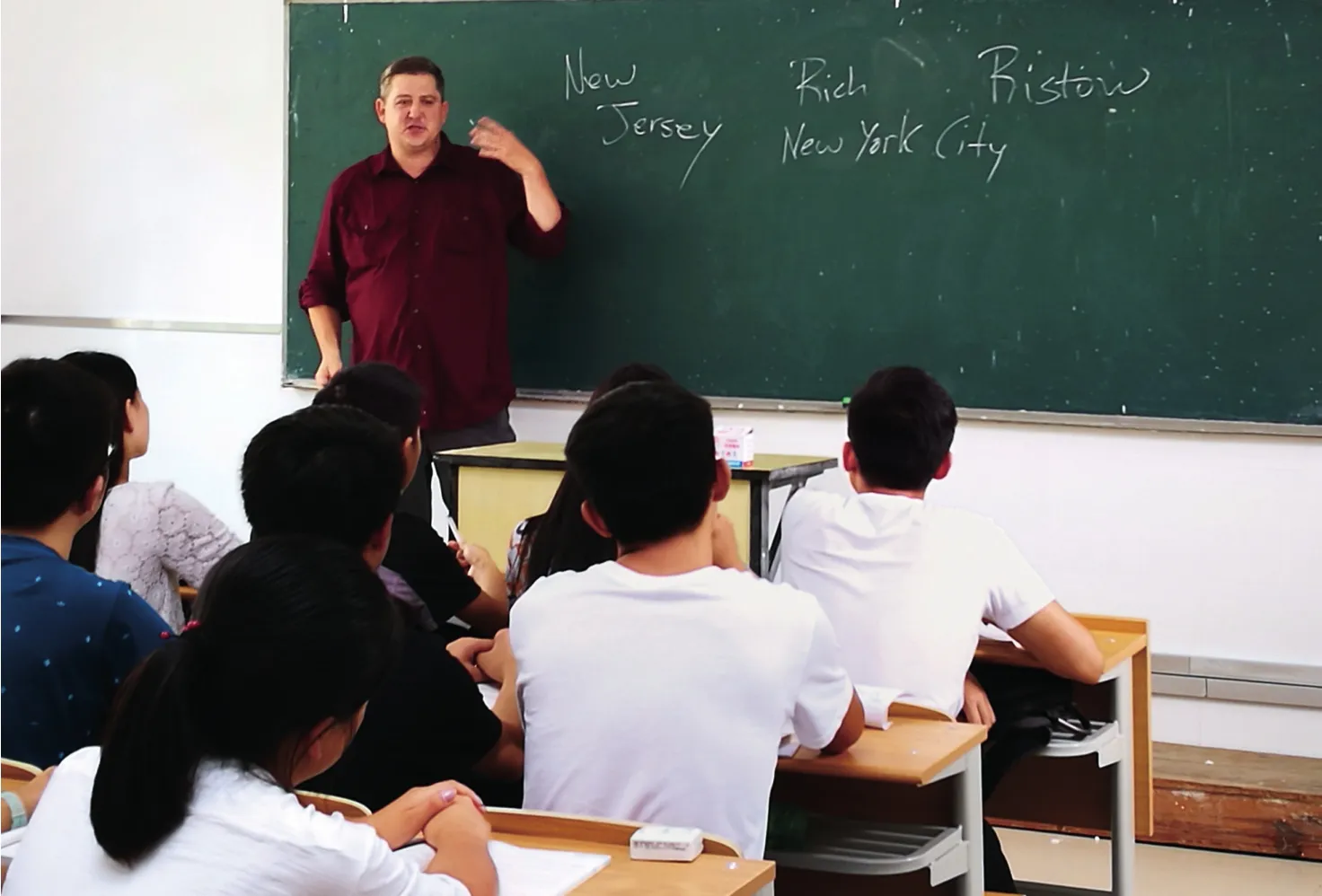一个在德国出生的美国人如何爱上鸭血粉丝汤?
2018-09-26理查德瑞斯特
文/理查德·瑞斯特
译/杨莉
“这汤,”我对父亲大声说,“是南京有名的风味小吃呢。”我眯着眼睛盯着电脑,然后抬头看着父亲。父亲正在看一部科幻电影,听我说话他停下来注视着我。我一边读电脑上的文字一边偷窥父亲的脸,“这叫鸭血粉丝汤,就是在汤里放些凝固的鸭血块,再放些鸭肠、鸭肫、鸭肝什么的,还有其他鸭的器官。”我朝父亲瞟了一眼,看到他脸色惨白,眉头紧皱,嘴唇轻撇。
“听起来有些恶心啊。”他说。
“是的呢。”我合上电脑,放到桌上说,“到了中国,我会尝试很多东西。但是这么恶心的东西,我想我永远也不会碰的。”
这次和父亲的对话发生在我即将到中国之前的三到四个月。那个时候,我已让我的招聘顾问帮我在南京寻找一份大学的职位。与此同时,我在尽可能多地了解这个城市,如果我准备在这个历史悠久的城市安家,那么了解当地的风土人情就很有必要。作为一个出生在德国的美国人,我从小被教导:表现出对东道主文化真正的兴趣,即是展示尊敬的最好方式。

Yinggui in Changzhou. Understanding Jiangsu food means seeking out what is local and near your home常州迎桂馒头店,寻味江苏意味着寻找当地的美食
“This soup,” I read aloud, “is a Nanjing delicacy.” I squinted at my tablet. Then, I glanced up at my father. He had paused the science fiction movie he was watching and eyed me intently. I wanted to make sure I could see his facial reaction as I started to read. “It’s made from cubes of congealed duck blood in a light broth. Mixed in with vermicelli noodles are duck intestines,gizzards, livers, and possible other organs.” I shot my dad a look. His face was white, and his mouth was slightly agape with a frown.
“That sounds utterly revolting,” he said.
“Yeah.” I put the computer tablet on a nearby table. “When I move to China, I will try lots of things. Just, I will never, ever eat something that sounds as disgusting as that.”
This conversation happened roughly three to four months before actually boarding a flight to China. At the time, I had told my recruiter to look for university positions in Nanjing.In the meantime, I was doing as much research about the city as I could. If I was prepared to call historic Nanjing my home,it seemed important that I learn something about its local customs. As an American who was born in a country like Germany,I was taught showing an honest interest in your host’s culture was the best way to demonstrate respect.
In the meantime, while my recruiter had been setting up Skype interviews, an offer came from a vocational school in Changzhou. The recruiter shared the potential salary number, and I realized it was actually more than what universities in Nanjing were offering. I changed targets and started reading up on Changzhou. In the end, the higher pay, lower cost of living, and slower pace of life seemed much more appealing, and I chose to take that position in Changzhou over the much more cosmopolitan Nanjing. Besides, I reasoned, Changzhou was close to not only Nanjing, but also Shanghai. Changzhou is in a really convenient location if you want to travel all over Jiangnan, and that was something I really wanted to do.
Years later, I have certainly seen and learned a lot about southern Jiangsu. I look forward to learning more, but a real irony popped up during my second year in Changzhou. I was out to dinner with a Chinese friend. It was in a food court, so there were no waiters. It’s mostly placing an order followed by self service. This friend set a huge bowl of soup in front of me.

理查德·瑞斯特(美国籍)2016年起至今在河海大学常州校区担任英语教师,2017年被授予“常州市荣誉市民”称号
我的招聘顾问一直在对我进行Skype面试,他给我提供了在常州的一所学校的应聘机会。招聘顾问告诉我可能的薪酬数字,我意识到这可能比南京的大学提供得要多,我开始转移目标,关注常州。这个城市环境优美,生活成本低,生活节奏慢,这些因素似乎更加吸引我,最后我还是放弃了大都市,选择了常州。对我来说,常州不仅靠近南京,还靠近上海。如果你想到江南旅游,常州是一个非常便捷的城市,这正是我真正想要的。
几年以后,我确实体验了很多苏南的风土人情,并期待有更多的发现。在常州的第二年,一个颇具讽刺意味的事情出现了。一次我和一位中国朋友出去吃晚餐,这是一个美食广场,没有服务员,客人自助下单。不一会儿,我的朋友就在我面前摆了一大碗汤。
“这是什么?”我好奇地问。
“试试吧。”我的朋友说。“如果你喜欢,我就告诉你是什么。”他狡黠地咧嘴一笑,“如果不喜欢,那就算了,这个我吃,然后给你点别的东西。”
我看着汤碗,一些暗红色的块状物漂浮在金黄色的汤面上。我笑着说:“呃,我知道这是什么。”
我的中国朋友似乎不太相信,说:“是吗,你真知道?”
我拿起筷子,指着那个暗红色的东西说:“我知道,这就是鸭血粉丝汤!”在那一刻,我突然想起和父亲的那次谈话,想起他那难受的表情,想起我胃部的反应。好吧,那确实是我最初的反应。那时在美国,而此时此刻,我在中国!我拿起汤勺,以一种开放的态度,尝了一小口。天哪,我有生以来第一次吃鸭子的血!对我来说,有点腥气。但再品下去,口感竟像豆腐般细嫩柔滑。我又试着喝了一口汤,吃了鸭肠和其他鸭杂。我有些惊喜,没想到南京的鸭血汤,竟然这么好吃!连汤带水,我把整碗鸭血汤全吃光了。
“Oh, what’s that?”
“Try it,” my friend said. “If you like it, I’ll tell you what it is.” He grinned slyly. “If you don’t like it, we’ll forget about it, I’ll eat it,and then I’ll order you something else.”
I looked at the soup’s golden broth. I saw purple cubes fl oating around, and I laughed. “Um, I know what that is.”
My Chinese friend appeared slightly confused. “Really, you do?”
I picked up my chopsticks and pointed at one of the purple blobs.“Yeah, this is Nanjing duck blood soup.” For a moment, I thought about the conversation with my father. I remembered his look of disgust and how my stomach turned while reading the ingredients to him. Oh well, I thought. That was America, and this is China. I picked up the ladle and served myself. Then, with an open mind, I tried it. Duck’s blood, to me, tasted like a coppery,slightly metallic tofu. It had the same slippery consistency as bean curd, as well. I sipped the broth and sampled the intestines and organs. Smiling, I felt slightly shocked. Nanjing duck blood soup turned out to be delicious and not revolting. I finished my dinner without a second thought and left the bowl empty.
But then again, I should put that into perspective. Of course it was not what I was expecting. The guy who read the soup recipe to his horrified father and the guy that actually tried it are two different people. I was once a person who only knew Chinese culture in the abstract—what I read in books and on the Internet and what I saw in Jet Li and Jacky Chan Films. That version of me was surrounded by Philadelphia cheese steak hoagies, pizza, hamburgers of multiple variations, and more. Of course duck intestines would sound utterly weird. Nobody in America eats that stuff, and I had nothing to compare it to. Once I moved to China, I realized I had to throw my preconceived notions out if I was going to make an honest attempt at living day to day life in Changzhou and southern Jiangsu in general.
当我再次审视这件事情的时候,我真没想到事情会是这样的。我突然觉得,那个曾把鸭血汤配料告诉他父亲,以至父亲受到惊吓的人,以及真正尝试过鸭血汤的那个人,是两个不同的人。我曾经是一个只懂抽象中国文化的人——我满脑子都是在书本和互联网上读到的东西,以及李连杰和成龙电影中看到的东西,那个“我”被费城芝士牛排、三明治、比萨饼、汉堡包等包围。在美国很少有人吃动物内脏,我并不想以此进行比较。到了中国,我渐渐意识到,要想在常州或苏南任何地方生活,就要诚实地去尝试,抛开任何先入为主的固有观念。
在中国,我遵循一条原则,如果一位中国朋友邀请我吃饭,就算食物看起来难吃,我一般也不会拒绝。因为那样做对主人的热情款待无疑是一次灾难。我是这里的客人,江苏热情地接纳了我,我获得一份稳定的工作,就像其他在常州、无锡、南京等地合法工作的外国人一样。这里不是美国,也不是欧洲,永远都不一样。期待一样的外国人纯属自欺欺人,应该“回家去”。老实说,待在家里他们会更快乐,更平和。但有时候,作为外国人,你必须走出自己的舒适区,这样才能更好地生活。更何况那些舌尖上的美味——诸如牛肚、鸭肫、鱼头等等——如果我纠结于它们是不是西式美食的话,我就吃不到这些美味佳肴了。
顺便说一下,我父亲也开始接受我的观点。他曾两次到常州来看我。第一次,一位同事把我俩带到了武进淹城景区的一家餐馆,点了一道特色菜——寨桥老鹅,里面有鹅肉和暗红色的鹅血块。“说实话,味道不错。”我父亲说,一点都看不出他以前曾是那么的反感。
几天之后,那个带我吃南京鸭血汤的朋友又带我和父亲出去吃晚餐。父亲和我又一次大快朵颐。
在坐公交车回去的路上,爸爸和我谈到我们一起吃过的那些美食。他发现,这里的中餐与美国中餐馆的中餐完全不一样。要了解中国文化,你必须入乡随俗,品尝当地特色美食是了解当地的最佳方式。况且各地美食林立,即使每天尝试,都不一定能了解中国美食文化的精髓。
“这还是值得一试的。”我说。
“是的,”我父亲应道,“确实如此。”
I have a rule, and I live by it. If I am dining with a Chinese friend, I am not allowed refuse something if I think it sounds or looks disgusting. Doing that would be a slap in the face of my friend’s hospitality. I am the guest here. China and Jiangsu have warmly welcomed me and provides with me a living wage, as it does to all other foreigners who are legally employed in cities like Changzhou, Wuxi, Nanjing, and elsewhere. This is not America or Europe, and it never will be. Foreigners who expect any different are deluding themselves and should go home.Honestly, they would be happier and more at peace with themselves if they did. Sometimes, you need to live outside your comfort zone to make living in China work. Also, some tasty things—cow stomach, duck gizzard, fish heads, and more – I would have never eaten if I was belligerent about food not being like “back in the west.”
Incidentally, my father has also come around to this line of thinking. As of this writing, he has visited Changzhou twice.The first time, a teaching colleague took the both of us to a restaurant in the Yancheng historic area of Wujin. We dined on a local specialty—zhai qiao old goose—that consisted of breast meat and congealed slabs of deeply purple blood. “This is actually good,” my father said. There was no hint of his earlier revulsion.
A few nights later, the friend that first introduced me to Nanjing duck blood soup took us both out to supper. My father and I enjoyed our dinner again.
During the 45 minute bus ride back to Wujin’s College Town,my dad and I discussed the different foods we’d tried together during his visit. He remarked that Chinese food in Jiangsu hardly resembles what Chinese-American restaurants back in the United States. We agreed on a few things, specifically. To get to know a culture, you have to eat locally. Also, cities in Jiangsu and all across China have so many specialties, you could try a new dish everyday and still not get even close to all the good things this country has to offer.
“It’s still worth a try,” I said.
“Yes,” my father said. “Yes, it is.”
(Rich Ristow teaches English at Hohai University’s Changzhou Campus.In 2017, he was named an honorary citizen of Changzhou.)
